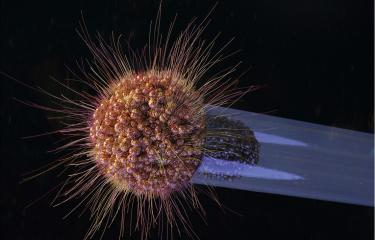New tests for rapid diagnosis of meningococcal meningitis have been developed and validated by the Institut Pasteur in Paris, and by CERMES in Niamey (Niger), an associated institute in the International Network of Instituts Pasteur. These tests can be used at the patient's bedside, and are formatted in two dipsticks, which can diagnose 4 serogroups of meningococcus (A, C, W135 and Y). They should help to improve the alert in the African at risk countries at the onset of outbreaks, and the patients' management. The results have just been published in PloS Medicine.
Press release
Paris, september 5, 2006
The development of new tools for simple and quick diagnosis of meningococcal meningitis that can be used at the patient’s bedside is a major challenge for public health. Bacterial meningitis is indeed a health issue of utmost importance in all countries within the "African meningitis belt", which stretches from Senegal to Ethiopia (21 countries constituting a population at risk of 250 million people); 50% of Neisseria meningitidis cases in the world occur in this zone. In addition to the seasonal increase in cases that occurs every year during the dry season, periodical outbreaks of a catastrophic nature can be observed with attack rates reaching 1000 cases per 100 000 inhabitants. In the inter-epidemic period, thousands of cases per year are due to N. meningitidis, but also S. pneumoniae and H. influenzae b.
In Africa, the culture of responsible bacteria is only possible in the capitals and large towns. The only non culture methods for the diagnosis of meningococcal meningitis are expensive and not practical in the field.
The tests developed by the teams of Farida Nato at the Paris Institut Pasteur and by Suzanne Chanteau at CERMES in Niamey comprise two duplex dipsticks (A and Y/W135) and (C and Y). They have been validated in Niger on meningococcal cultures and on cerebrospinal fluids from patients. The results are obtained in 10 minutes from a few drops of cerebrospinal fluid. The specificity and sensitivity are excellent in laboratory conditions. They are currently being validated by health staff in field conditions in bush dispensaries. They can be used at 25°C and even at 45°C, a temperature range frequently encountered during the meningitis season in the Sahel. Another considerable advantage compared with traditional diagnostic tests is that their possible storage outside of refrigerator. Their positive impact on public health in Africa should be high, in particular for the microbiological surveillance of outbreaks that is required to choose the proper vaccine..
Indeed, changes in the incidence of the various meningococcal serogroups in the "meningitis belt" make the vaccination strategies complicated. Meningitis epidemics in this region of the world belonged traditionally to serogroup A. For several years, the serogroup W135 has been observed sporadically, but in 2002, it revealed its epidemic potential with a large-scale epidemic in Burkina Faso. Vaccines against the serogroup W135 (A/C/W135, A/C/Y/W135) are produced in small quantities and remain costly, so their use as a response to epidemics must be justified by an accurate diagnosis of the serogroup in question. For 2 years, the serogroup X, for which no vaccine currently exists, is increasingly prevalent in Niger. The risk of epidemic related to this serogroup is a real one and a fast test is currently being developed at the Institut Pasteur in Paris.
Microbiological surveillance of bacterial meningitis in this region of Africa is therefore more necessary than ever, but laboratories are rare and badly equipped. The dipstick tests developed by the researchers at the Institut Pasteur have been designed to be adapted to this surveillance. It is planned to validate them in other countries. Tests will be carried out at CERMES by the end of 2006, thanks to technological transfer from the Institut Pasteur and with the financial support of Sanofi Pasteur.
Sources
"New rapid diagnostic tests for Neisseria meningitidis serogroups A, W135, C and Y": PLoS Medicine, September 2006.
Suzanne Chanteau (1,2), Sylvie Dartevelle (1), Ali Elhadj Mahamane (2), Saacou Djibo (2), Pascal Boisier (2), Farida Nato (1)
1. Institut Pasteur , PT5 technology platform, Paris
2. CERMES, National Reference Centre for Meningitis, Health Ministry, International Network of Instituts Pasteur, Niamey, Niger
The Institut Pasteur is a non-profit-making private foundation dedicated to biomedical research, public health and teaching. Almost 2600 people work at the Paris campus, where a large part of the research is dedicated to infectious diseases. The International Network of Pasteur Institutes groups together 30 institutes on five continents involving 9500 people.
The CERMES (Niamey, Niger) is a national biomedical research institute, and has been an associate of the International Network of Instituts Pasteur since 2002. It is supported by the Coopération Française and the Institut Pasteur . Bacterial meningitis and malaria, significant problems for public health in Niger and the whole Sahel region, are the main research issues. Training is also one of its main priorities. It employs almost 65 people.
Contact press
Press department, Institut Pasteur
Nadine Peyrolo ou Corinne Jamma
+33(0)1 40 61 33 41 - cjamma@pasteur.fr



